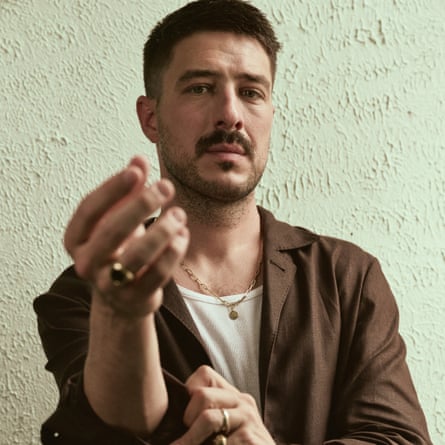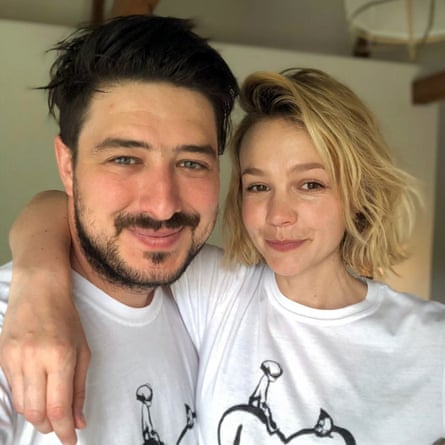Marcus Mumford says he doesn’t actually remember writing Cannibal, the extraordinary song that opens his debut solo album, Self-Titled. But he’s very clear about the circumstances leading up to writing it. They began with a collapse into alcohol addiction and binge-eating towards the end of the last Mumford & Sons tour in 2019. “When you’re travelling all the time, you’re able to convince yourself of anything, to make excuses not to take responsibility,” he says. “Oh, I’m on my own, so I can have a few drinks in my room,” or “I can have a few pints of ice-cream in my room because I’m medicating loneliness, or shame, or whatever it is.”
Then there was a period where “people around me said: ‘You’ve got to figure this out, mate,’ but they didn’t know what the problem was, and neither did I”. It was followed by a time when Mumford went into trauma therapy and a period when he didn’t want to write songs at all: he was “in denial about being an artist, when I’d only hang around with, like, farmers or estate agents”.
He does remember recording the demo, and playing it to his mum and having to tell her about its subject matter. Cannibal starkly details the sexual abuse Mumford experienced as a six-year-old, in terms that are variously furious – “you fucking animal” – and self-lacerating and that, ultimately, edge towards forgiveness. It was something he’d kept to himself, disclosing it for the first time during a therapy session the previous year, which Cannibal also describes: “When I began to tell, it became the hardest thing I ever thing said out loud,” he sings, “the words got locked in my throat – man, I choked.” Grace, the song that follows it on Self-Titled, describes the ensuing conversation: “I’m fine, it’s all right, do I sound like I’m lying?”
He never thought about not releasing Cannibal, or Grace, or indeed any of the other songs on the album, despite their personal nature (Mumford asked a trauma specialist to check through them because “I didn’t just want to hang traumatic stuff out there and activate or trigger people”), or the fact that releasing them would make their subject matter a global news story, an inevitable consequence of the millions of albums he sold as the frontman of Mumford & Sons.
“It felt like a natural and quite helpful part of my process, now I was less engulfed in shame,” he says. “Because of what I do and who I am, the natural extension of this process of handling and coming to terms with this stuff was to write a song about it.” He laughs. “Taking these intimate things, these really private moments and publicising them as widely as possible – it’s just a fucked-up thing to do. But there’s a magic in it, I think, because you offer the opportunity for people to connect through it.”

Even so, Self-Titled was not an easy album to make. We are sitting in a west London studio where Mumford & Sons recorded in the 00s. When they made their first album here, he says, it took four weeks. Self-Titled took 18 months. Some of that was down to painstaking attention to detail. But Mumford has also talked about breaking down in tears during the recording of Cannibal, of combing every word of the lyrics with producer Blake Mills to ensure they were “relentlessly honest”.
The album features Phoebe Bridgers, Clairo, Monica Marti and Brandi Carlile, who compares the recording sessions to “a trust fall”, with a succession of female artists “standing behind Marcus. I just think that women were a little more capable of shouldering the message.”
Mumford says he had refused to admit he was making a solo album, despite the fact that he’d played the other members of Mumford & Sons the songs and they told him that’s what he should do – and that he’d played the songs to Elton John and got not just the same response but “a talking-to from him and David [Furnish] about being fearless and unafraid that I’ll never forget”.
“Even up to last November, when I was in the studio, I was refusing to call it a solo album. Because once you switch to thinking of it as an album, then you inevitably start thinking about labels, how you present it to the world, how people will listen to it and I thought: nothing can distract from writing this, I can’t start thinking about how people will listen to it, or how I’m going to talk about it, or the live show.”
The end result is extraordinary. The lyrics – about addiction, faith and redemption – are astonishingly powerful, but the songs would be strong regardless of their subject matter. It’s tempting to say it’s an album people who don’t like Mumford & Sons may like. That’s partly because its vibrant stew of country, electronica and rock sounds absolutely nothing like that band. And partly because it’s the kind of album you want people to hear without prejudice. Mumford & Sons were hugely successful but they also attracted virulent opprobrium, as much for their image as their music. The bunting, naval flags and old shop fronts on their album sleeves, the waistcoats and ties: it was all seen as redolent of a twee, Cath Kidston-designed, Keep Calm and Carry On brand of nostalgia for a nonexistent English past. Viz comic mocked their affectations – “they tour the English countryside in their rustic twin-turbo jet-powered flying haywain” – while the artist Scott King produced a 2013 print that read STOP MUMFORD AND SONS, claiming: “They represent everything that is wrong with this country today.”
“I’m sure it made me more defensive,” says Mumford. “I tried not to read that stuff, but anyone who tells you that they don’t read it at all, or that it doesn’t somehow filter through, is lying. But I think that, a couple of years ago, before I even started this process of healing, having a family, priorities changing a bit, Covid in some ways, made me care a lot less what people think about me. And I historically have been a people-pleaser, so the idea that I haven’t been pleasing people has been difficult at times. ‘Oh, I wasn’t setting out to offend you! How can I repair this broken relationship?’ – which of course wasn’t in existence anyway. I’m now able, with some distance, perspective and changing priorities to think a bit more fondly, actually, and think, that’s OK.”

One thing that seemed to rile Mumford & Sons’s critics was their Christianity: Mumford’s parents established the Association of Vineyard Churches in the UK; he first met his wife, actor Carey Mulligan, at a Bible study camp. Christianity wasn’t front and centre in their music, but nor was it exactly hidden. When they won a Grammy, Mumford thanked God in his speech, which, as he puts it, “seemed weird to some people”. “Serve God, love me and mend,” went the title track of their debut album, Sigh No More: it’s a quote from Shakespeare, but still.
Mumford’s faith is there again on Self-Titled, although not in the places I thought it was. I’d assumed it was the subject of Stonecatcher, with its lines about having “the strength to get back on my knees again”, but Mumford says the song is actually based on Just Mercy, a memoir by Bryan Stevenson, a US lawyer whose Equal Justice Association has saved more than 130 people from the death penalty. Prior Warning, however, features imagery derived from a passage in John’s gospel: Jesus drawing in the dust to calm an angry mob.
He says his experiences over the past three years have “deepened” his faith: certainly, he’s more confident about discussing it in public than he once was. “Again, you know, that people-pleasing thing. I feel less insecure, I suppose, about my faith. I remember a cover interview with Rolling Stone where the guy was, like, needling me on faith and I’m not sure that would happen now. Maybe we’re all learning how to be more tolerant of each other and that would be less of a point of difference. It actually feels to me it’s more accepted to be lots of things, including someone who has a faith, which is a good thing.”
He reaches for his phone, and starts searching for a photo. “I met the pope yesterday!” he beams.
I beg your pardon? “I went to Rome and met the pope. It was amazing. I went with a group of artists to talk about art and faith, in the Vatican, which is kind of a bizarre thing to do, this seat of institutional power that historically is so complicated. But it was really beautiful and really cool, really interesting. In the past, I would either have been insecure about oversharing somehow with my faith publicly or insecure about, like, I don’t deserve to be here. It’s not like I’ve had some revolution in my ego, like yeah, I fucking deserve it all, it’s like: no, this is cool, I can embrace this.”

He’s keen to underline that Mumford & Sons haven’t broken up, although when I ask him if they’re still a going concern he laughs: “‘Concern’ is a great word to use.” Quite aside from Mumford’s own issues, last year, his childhood friend Winston Marshall left the band after praising far-right journalist Andy Ngo’s book Unmasked: Inside Antifa’s Radical Plan to Destroy Democracy: he first apologised, then recanted his apology and doubled down, announcing his departure from the band. The general belief is that he was asked to leave, but Mumford says the opposite: he “really tried to reason with him to stay”, believing “he was embroiled in something that didn’t represent the person he is”, despite the backlash he knew would follow if Marshall chose to continue with the band.
“I felt like there isn’t a huge amount of patience, publicly, and I like the idea of not being dictated to by that level of impatience. And I felt at the time: Win, you’re my mate, I know that you’re not a fascist and I don’t think you need to …” His voice trails off. “Like, we’re not in the public statements game. That’s changed for him. He is in the public statements game now. But I never felt the need for the band to make a public statement about this thing, because I felt like you can show people through your art that you’re not a fascist, right? Let’s not react, let’s be calm, be patient, recognise when you’ve hurt people and hold our hands up for that in a way that’s gracious, but then model disagreement on some stuff, maybe. But it was clear, I think to him before it was to us, even: ‘No that’s not going to work because I’ve got all this other shit I want to say.’”
Marshall seems to be forging a career as a rightwing pundit: he’s got his own podcast series hosted by the Spectator (recent guests: Laurence Fox and Ariel Pink) and has appeared on GB News, a station his father helped fund and served as chair of. Still, I say, it seems a huge sacrifice to make, leaving a hugely successful band you formed with your friends in order to pal around with Dan Wootton and tweet against transgender rights and Joe Biden.
“It is. Yeah, it is. And he felt it was the right one for him. He wanted to go and do what he’s doing now. Which is hard to do when you’re writing songs with other people who have feelings about how you’re represented in the world. I disagree with Win on so much, and he knows that. We’ve been friends for a long time, and a lot of that’s private, you know? But when you’re in this creative marriage, which is what is it … there has to be that telos, a kind of creative alignment to be able to do this thing that brings such intimacy, and if that’s not there, then you’re staying together for the wrong reasons. And he didn’t do that, because his priorities changed. So you’ve got respect that. I don’t agree with it.”
He thinks Mumford & Sons will reconvene next year, and “figure it out. If we end up getting in the room and it’s shit, I don’t think any of us are going to want to do it.” Before then, he plans to go on tour. That seems like hard work, I say, singing songs about horrific personal experiences night after night. He shakes his head. “No, I think that’s part of the whole thing for me, part of the process. It doesn’t make me relive anything when I play Cannibal. In the way I felt I had to approach or felt compelled to approach talking about this record, it started with the heavy stuff, but the rest of the record … yeah, there’s some heavy stuff, but there’s an invitation there that makes it appropriate for a congregational space. It’s not just like: ‘Look at all my pain,’” he smiles. “Really, it’s an album about freedom.”
